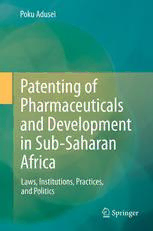
Patenting of Pharmaceuticals and Development in Sub-Saharan Africa: Laws, Institutions, Practices, and Politics PDF
Preview Patenting of Pharmaceuticals and Development in Sub-Saharan Africa: Laws, Institutions, Practices, and Politics
Patenting of Pharmaceuticals and Development in Sub-Saharan Africa . Poku Adusei Patenting of Pharmaceuticals and Development in Sub-Saharan Africa Laws, Institutions, Practices, and Politics PokuAdusei FacultyofLaw UniversityofGhana Accra Ghana ISBN978-3-642-32514-4 ISBN978-3-642-32515-1(eBook) DOI10.1007/978-3-642-32515-1 SpringerHeidelbergNewYorkDordrechtLondon LibraryofCongressControlNumber:2012950013 #Springer-VerlagBerlinHeidelberg2013 Thisworkissubjecttocopyright.AllrightsarereservedbythePublisher,whetherthewholeorpart of the material is concerned, specifically the rights of translation, reprinting, reuse of illustrations, recitation,broadcasting,reproductiononmicrofilmsorinanyotherphysicalway,andtransmissionor informationstorageandretrieval,electronicadaptation,computersoftware,orbysimilarordissimilar methodologynowknownorhereafterdeveloped.Exemptedfromthislegalreservationarebriefexcerpts inconnectionwithreviewsorscholarlyanalysisormaterialsuppliedspecificallyforthepurposeofbeing enteredandexecutedonacomputersystem,forexclusiveusebythepurchaserofthework.Duplication ofthispublicationorpartsthereofispermittedonlyundertheprovisionsoftheCopyrightLawofthe Publisher’s location, in its current version, and permission for use must always be obtained from Springer.PermissionsforusemaybeobtainedthroughRightsLinkattheCopyrightClearanceCenter. ViolationsareliabletoprosecutionundertherespectiveCopyrightLaw. The use of general descriptive names, registered names, trademarks, service marks, etc. in this publicationdoesnotimply,evenintheabsenceofaspecificstatement,thatsuchnamesareexempt fromtherelevantprotectivelawsandregulationsandthereforefreeforgeneraluse. While the advice and information in this book are believed to be true and accurate at the date of publication,neithertheauthorsnortheeditorsnorthepublishercanacceptanylegalresponsibilityfor anyerrorsoromissionsthatmaybemade.Thepublishermakesnowarranty,expressorimplied,with respecttothematerialcontainedherein. Printedonacid-freepaper SpringerispartofSpringerScience+BusinessMedia(www.springer.com) I dedicate this book with love: To my granny, Afua Awo Donkor, who started it all! To my late teacher, Stephen Kwadwo Bonnah, who tutored me!! To my mom, Florence Achiaa, and my uncle, Samuel Nsiah, who tended it!!! & To my wife, Esther, who continues to bear the brunt of it!!!! . Foreword Dr.PokuAduseihasinthisbookventuredintoareashithertogiventheshortshrift bymanyscholars.Thiswell-writtenbookdealswiththecomplexissueofwhether patentprotectioninSub-SaharanAfricahashadnegativeanddevastatingimpacts onpersonsinAfricafacingchallengesofaccesstovitalmedicinesinthecontextof thethreatsposedbyHIV/AIDS,malaria,andtuberculosisepidemics. Movingbeyondthecliche´dbromidesaboutsufferinganddiseaseinAfrica,the authorinterrogatestherelationshipbetweentheglobalpatentsystemandaccessto vital drugs in the context of the HIV/AIDS, malaria, and tuberculosis epidemics. Thesuprememeritofthisbookisitscourageousunmaskingofthe‘Africaisdying’ industry supported by lobbyists, NGOs, donors, and scholars who have fed fat on theirsupposedexpertiseofallthingswrongwithAfrica.Despitethenever-ending catalogueofdiseasesandinfirmitiesafflictingpoorpeopleacrosstheworld,andin Africainparticular,littlenuancedandgroundedworkhasbeendoneonthesubject in a manner that takes into serious account the necessary complexities, if not complicitiesofvariousactors. Happily,thisbookmarksadeparturefromthetiresomeroutine.Byitsrigorous andholistictreatmentofthesubject,anditsengagementwiththehumandevelop- ment question which ultimately undergirds the question, the author maps a path towardsresolvingtheproblems.Dr.Aduseiwritesinadirectandlucidmanner.His criticisms of contemporary literature are informed and evenhanded. He avoids bombasticrhetoric. More importantly, this book is evidence-based. This is a strong point. In addi- tion, the author demonstrates alertness to the implications of his findings and has showncourageinpursuingthelogicofhisarguments.Thisisaverytimely,well- written,andusefulworkandisverylikelytoinfluencepolicy-making.Itsinfluence wouldalsobeimpactful. OsgoodeHallLawSchool IkechiMgbeoji Toronto vii . Preface and Acknowledgments MahatmaGandhi(1869–1948)onceidentifiedtwoofthesevensinsintheworldas: “commerce without morality” and “science without humanity.” I do not know if Gandhi’s advice to moderate trade and science for the benefit of humanity had anythingtodowithpatentlaw.Butsuchahumanistapproachtolifeiswhatmany voices from different parts of the globe have articulated in policy and academic discourseonpatents,andmineisnoexception.Thisbookthusadvocatesaneedto reconstructtheglobalizedpatentregimetoaddresspublichealthanddevelopment challengesthatconfrontthecitizensofcountriesinSub-SaharanAfrica(hereinafter SSAorAfrica). This book was inspired by the absence of a comprehensive study of the connections between patents, access to medicine, and development in SSA. My interest in this topic developed from witnessing firsthand the hardships that individualsgothroughinpartsofAfricatoobtaintreatmentforotherwisecurable diseases. This book, therefore, contributes to the rich discourse on patents, public healthanddevelopment,fromasubalternperspective,byproposingalegalframe- work for the adoption of pharmaceutical patents that serve human development needs in SSA. The book will serve as a resource text for students, scholars, and policy-makers working in the fields of patents, public health, constitutional law, politicalscience,anddevelopmentstudiesinAfrica andbeyond. Theresearchfor thisbookwasconductedinSeptember2008toJanuary2012. The book outlines the systemic problems associated with the prevailing globalized patent regime and the regime’s inability to promote access to life- saving medication at affordable prices in poor regions such as SSA. The book then goes on to argue that for pharmaceutical patents to retain their relevance in SSAcountrieshumandevelopmentconceptsmustbeintegratedintoglobalpatent lawandpolicy-making.Anintegrativeapproachhereimpliesdevelopingadditional public health and human development exceptions/limitations to the exercise of patent rights with the goal of scaling up access to essential medicines to treat ix
